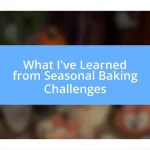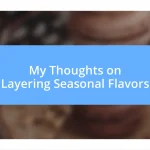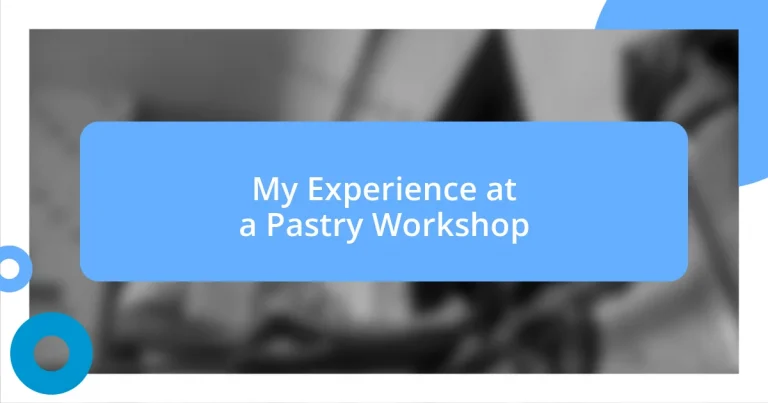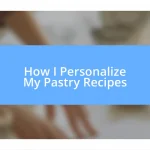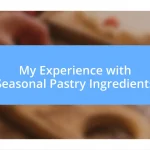Key takeaways:
- The author experiences a blend of excitement and nervousness during the pastry workshop, fostering camaraderie among participants as they share tips and support each other.
- Choosing the right workshop is crucial and involves considering skill level, instructor experience, focus area, location, and duration to ensure a fulfilling experience.
- Creating a signature pastry and sharing it with others highlights the transformative power of baking, emphasizing personal expression and connection through shared culinary experiences.
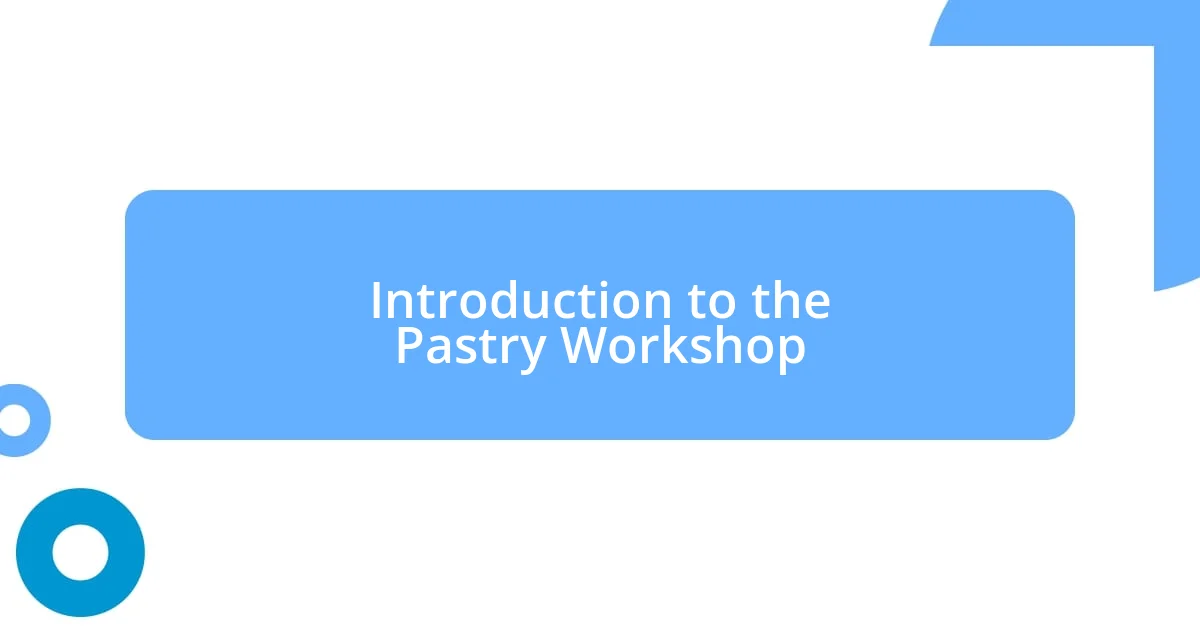
Introduction to the Pastry Workshop
The moment I stepped into the pastry workshop, I was engulfed by the sweet, buttery aroma that seemed to wrap around me like a warm blanket. It was contagious; I couldn’t help but feel a wave of excitement as I spotted the neatly arranged tools and ingredients, all waiting for us to transform them into something magical. Have you ever wondered what it’s like to create a delicate pastry from scratch?
As the instructor welcomed us, I noticed a mix of nervousness and enthusiasm in the room. I felt it too. It was almost palpable. Each one of us had a unique reason for being there—some were beginners, while others were seasoned bakers wanting to refine their skills. I found myself reminiscing about my first attempts at baking—how each failure taught me something, forging a deeper love for this craft. How often do we underestimate the power of learning from our mistakes?
Throughout the workshop, I was amazed by the camaraderie that formed among participants. We shared tips, laughed over our flour-covered hands, and cheered each other on as we tackled challenging techniques together. There’s something truly special about creating alongside others, wouldn’t you agree? It’s in these shared moments that the real magic of baking begins.
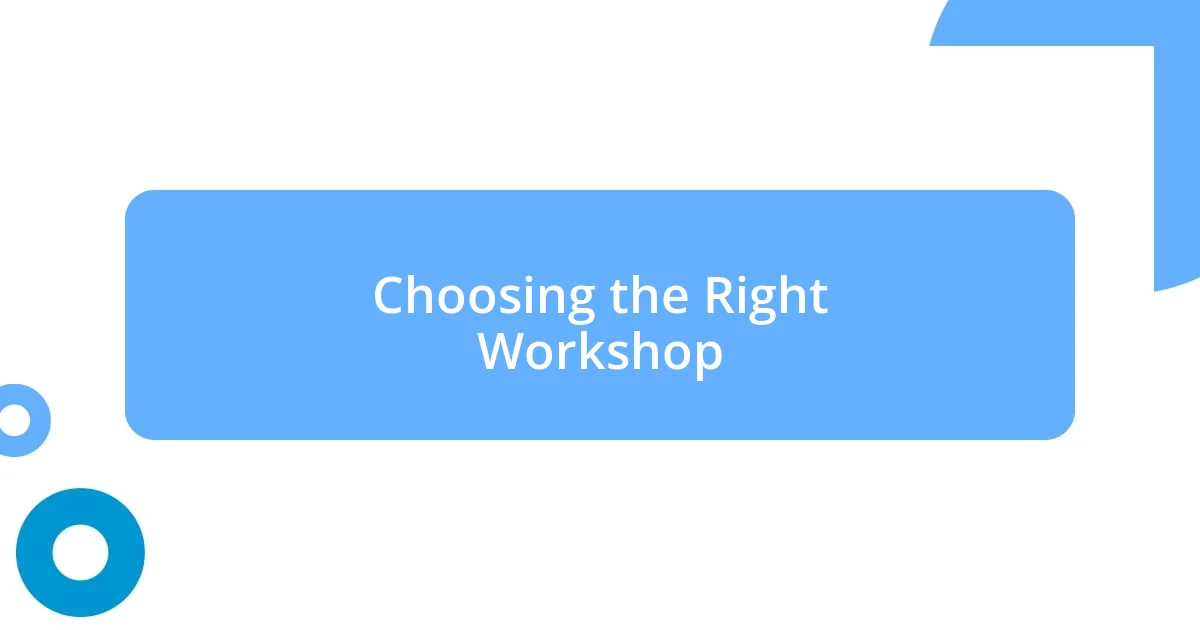
Choosing the Right Workshop
Choosing the right pastry workshop can feel overwhelming with so many options available. I remember my first time looking at different workshops and thinking, “Which one is right for me?” It’s essential to consider factors like skill level and specific techniques you want to learn. For instance, some workshops focus on classic French pastries, while others might dive into modern desserts or even vegan baking. Reflecting on my own journey, I found that selecting a workshop aligned with my interests made all the difference in my experience.
Another important aspect is the instructor’s experience and style. I once attended a workshop where the chef had an incredible resume but struggled to connect with the participants. I walked away feeling a bit lost despite the chef’s impressive credentials. Compare that to a workshop I took with a local pastry chef who shared personal stories of her baking failures and triumphs, making the learning environment more relatable and inspiring. This demonstrates that the right instructor can elevate the workshop experience, turning it into more than just a class—it becomes a shared journey.
Lastly, don’t forget to check the location and duration of the workshop. Convenience matters! I once joined a weekend-long session in a different city, which turned out to be a delightful escape but also required a lot of planning. Think about your schedule and whether you prefer an intensive week or a casual weekend. By carefully considering these elements, you’ll surely find the workshop that resonates the most with you.
| Factor | Considerations |
|---|---|
| Skill Level | Beginner, Intermediate, Advanced |
| Instructor Experience | Credentials, Teaching Style |
| Focus Area | Classic, Modern, Vegan Baking |
| Location | Local, Destination |
| Duration | Weekend vs. Week-long |
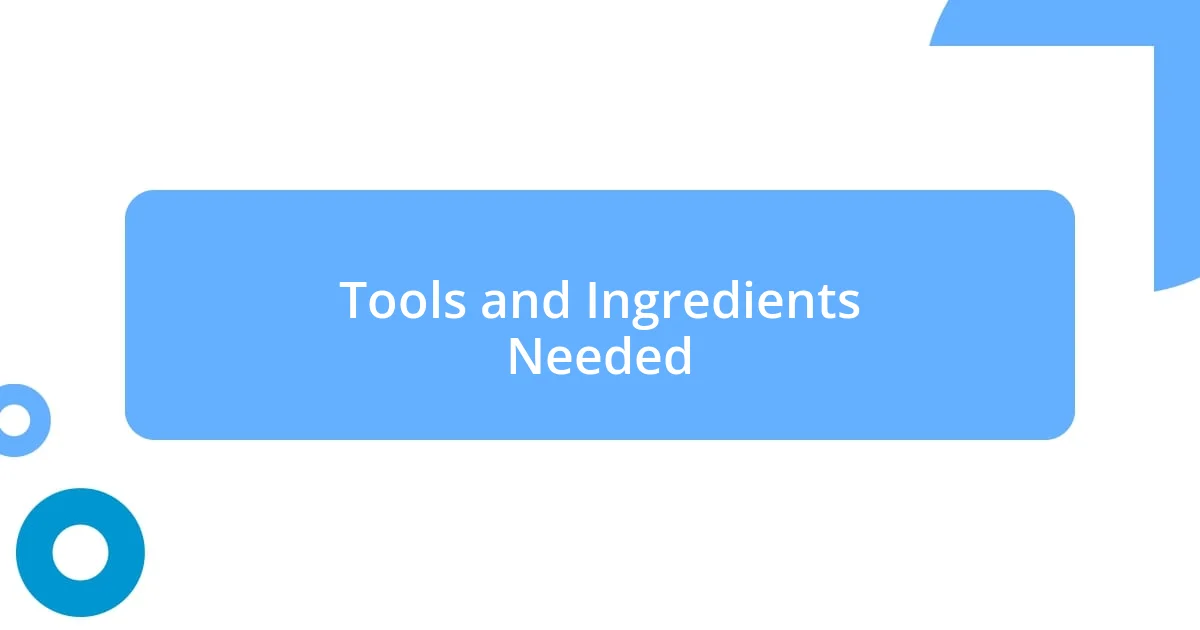
Tools and Ingredients Needed
When it comes to pastry workshops, having the right tools and ingredients can make all the difference in your experience and results. I vividly recall the first time I laid eyes on the gleaming equipment—rolling pins, pastry brushes, and those delicate silicone molds that seemed to hold endless possibilities. Just seeing them all together evoked a sense of anticipation in me. Each tool served a specific purpose, and having them at your fingertips really elevates the art of baking.
Here’s a list of essential tools and ingredients you’ll typically need for a pastry workshop:
-
Tools:
- Rolling pin
- Pastry cutter
- Silicone baking mats
- Mixing bowls
- Whisk and spatula
- Offset spatula
- Piping bags and tips
- Measuring cups and spoons
-
Ingredients:
- All-purpose flour
- Granulated sugar
- Unsalted butter
- Baking powder and baking soda
- Eggs
- Milk or cream
- Vanilla extract
- Salt
I still remember the exact moment I realized the importance of high-quality ingredients; we used fresh, organic butter during one of our sessions, and the difference in flavor was astonishing. It’s those little things that stick with you—like the rich, creamy texture that just melted in my mouth. I believe the right balance of tools and ingredients sets the foundation for creativity, turning a simple workshop into a treasure trove of delicious possibilities.
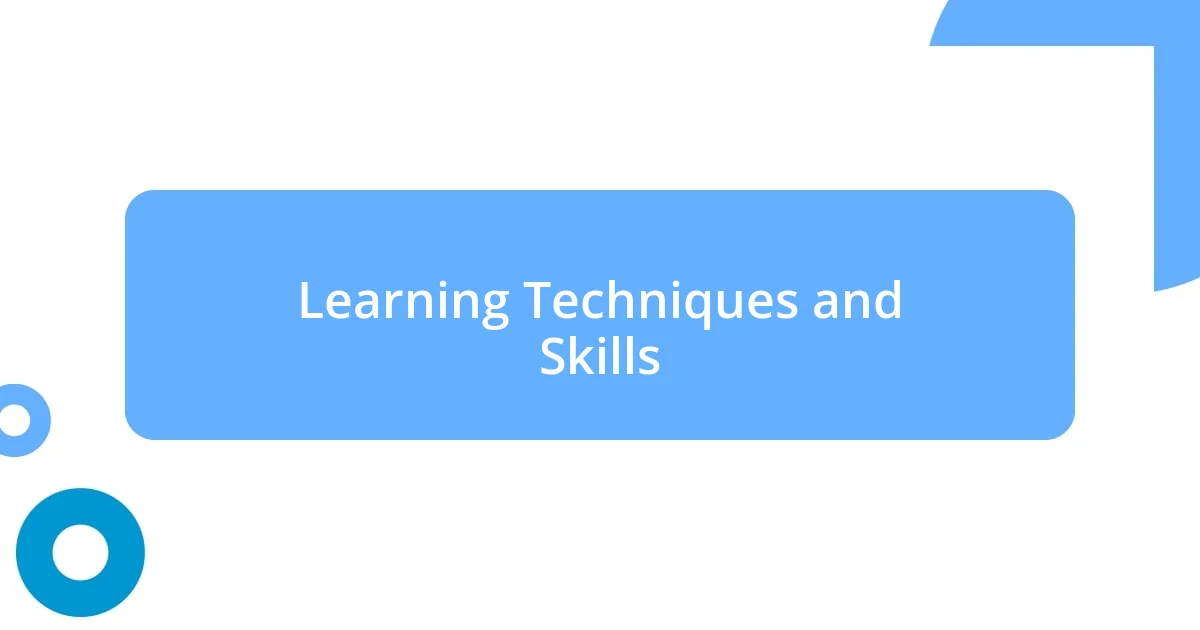
Learning Techniques and Skills
Learning new techniques and skills at a pastry workshop is truly exhilarating. During my first session, I was introduced to the art of tempering chocolate, a technique that seemed almost magical. At first, the thought of managing the precise temperature felt intimidating. But as the instructor guided us step-by-step, I felt a wave of confidence wash over me. By the end, I was not just melting chocolate; I was creating glossy, tempered chocolate that I proudly molded into intricate shapes.
One of the standout moments for me was mastering the elusive art of pâte à choux. I’ll never forget the moment I pulled my golden-brown éclairs from the oven. They were light, airy, and had that perfect pop when I took a bite. I had struggled with this technique for so long, and witnessing the outcome of my efforts was a major confidence boost. I often find myself asking, “Can I really do this?” and workshops like this made me realize that with practice and guidance, I truly can.
There’s something incredibly engaging about learning in a hands-on environment where everyone is equally passionate. I remember a fellow participant who was struggling with her pastry dough; we all rallied around her, sharing tips and encouragement. It highlighted just how much these workshops teach not only technique but also collaboration and support. The atmosphere is electric, and it’s in these moments that I recognized the true essence of baking: it’s about sharing experiences and uplifting each other, one pastry at a time.
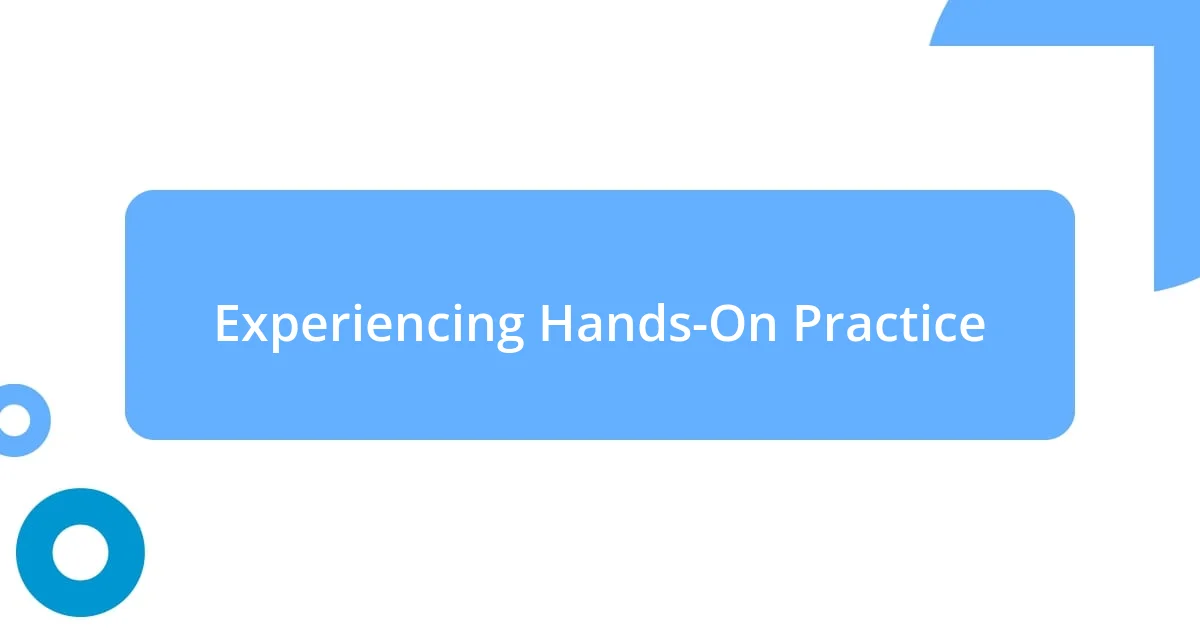
Experiencing Hands-On Practice
Once the instructor called us to the workstations, I felt a mix of excitement and nervous energy. The moment I plunged my hands into the cool, smooth dough, it was like I was connecting with the pastry itself. I vividly recall how satisfying it was to knead and roll, each movement bringing a sense of relief and joy. Is there any feeling quite as profound as shaping something with your own hands? I can assure you, there’s not.
Midway through the workshop, we had to prepare our own fruit tarts, and that was where I truly found my groove. I remember hesitating at first, unsure if my tart shell would turn out as golden and flaky as I hoped. But as my fingers deftly shaped the dough in the mold, I started to feel an overwhelming sense of accomplishment. Pulling that perfectly baked tart out of the oven and watching it cool was like unveiling a masterpiece I’d created all on my own. The mingling scents wafting from the kitchen felt like a well-deserved reward for my hard work.
Interacting with the ingredients and crafting something beautiful reignited my passion for baking. I noticed how each participant approached their creations differently, adding their own flair—some drizzled chocolate, while others sprinkled extra nuts as toppings. Watching this creativity unfold made me realize that hands-on practice isn’t just about following instructions; it’s about unlocking your personal style and letting it shine. Isn’t it fascinating how a simple pastry can serve as a canvas for self-expression?
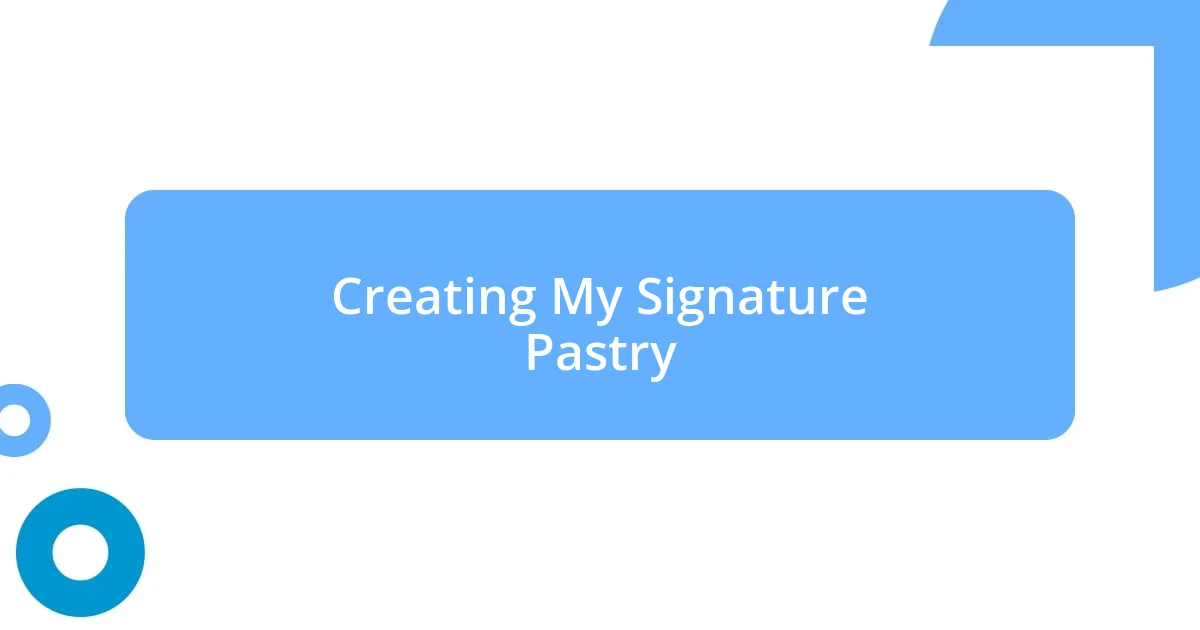
Creating My Signature Pastry
Creating my signature pastry felt like an adventure in itself. I decided to experiment with a classic crème brûlée tart but infused it with lavender. As I whisked together the egg yolks and sugar, I couldn’t help but feel a surge of creativity. The delicate scent of lavender filled the air, and I smiled, thinking about how the flavors would transport anyone who tasted it. Isn’t it magical how a few simple ingredients can spark such a vibrant journey?
With each layer I built, from the buttery tart shell to the silky custard, a sense of pride washed over me. When I finally caramelized the sugar on top, the satisfying crack of the brûlée layer revealed my masterpiece. There was a moment of silence as I took that first bite—the creamy sweetness combined with the floral notes was euphoric. It made me reflect on how often we limit ourselves in the kitchen; stepping out of my comfort zone opened up delightful new worlds of flavor.
What truly made the experience unforgettable was sharing my creation with my fellow participants. Their faces lit up with delight as they tasted my signature pastry, and that collective joy felt like a celebration of our hard work. I realized then that baking isn’t just about the end product; it’s about the connections made through shared experiences and flavors. After all, isn’t creating something special all about bringing people together?
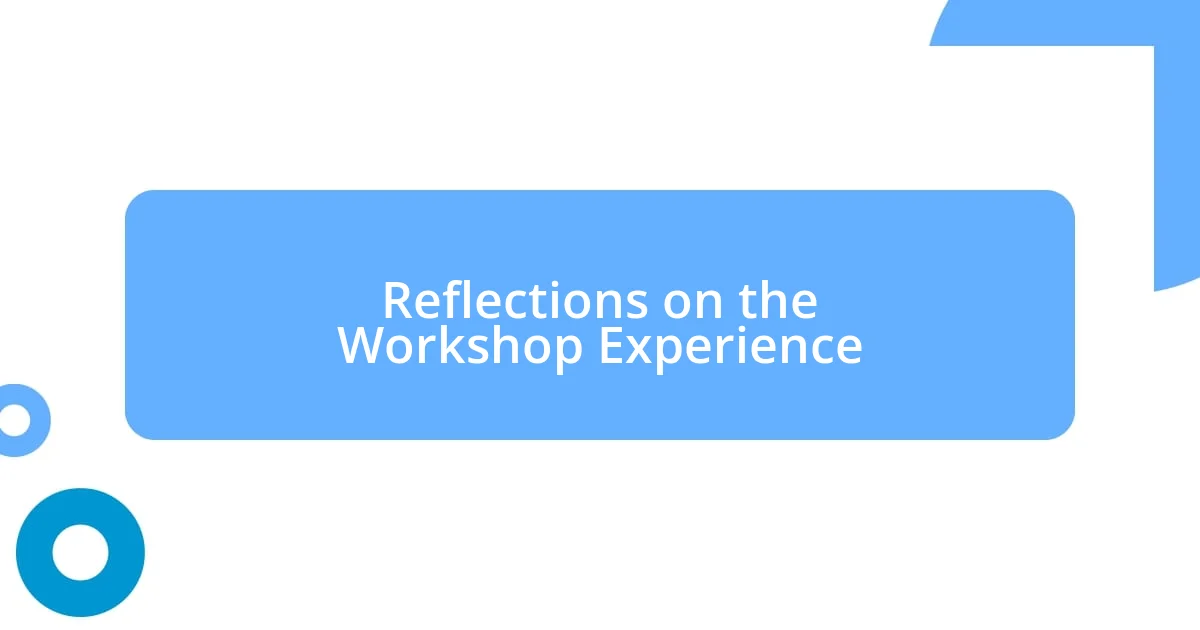
Reflections on the Workshop Experience
Reflecting on the workshop, I can’t help but think about the transformative nature of learning in a creative space. It was more than just whipping up pastries; it felt like peeling back layers of self-doubt and discovering what I’m capable of. Have you ever had that rush of realization when you try something new and surprise yourself? In that moment, I grasped the importance of stepping outside my comfort zone, realizing that the workshop environment fostered a sense of camaraderie and encouragement I often don’t find in my own kitchen.
As I looked around, witnessing my fellow participants share their stories and baked goods, I felt a wave of gratitude wash over me. It was heartwarming to experience that shared passion—each bite of their creations was a glimpse into their personalities and backgrounds. Wouldn’t it be wonderful if every cooking experience felt like that? It made me realize how food has the incredible power to connect us, telling stories that words sometimes can’t.
In those few hours, baking transformed into a heartfelt journey of self-discovery and connection. My initial reservations faded away as we created a space where everyone’s designs and flavors were celebrated. The laughter and joy that filled the room was a reminder of why I initially fell in love with baking. Isn’t it splendid how we can explore our individual identities through something as straightforward as pastry?



